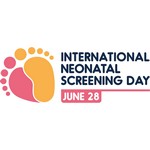International Neonatal Screening Day Date in the current year: June 28, 2026
 International Neonatal Screening Day (INSD) is celebrated annually on June 28. The day was created to raise awareness of the importance of timely diagnosis for children with serious congenital disorders requiring immediate treatment.
International Neonatal Screening Day (INSD) is celebrated annually on June 28. The day was created to raise awareness of the importance of timely diagnosis for children with serious congenital disorders requiring immediate treatment.Many congenital conditions are treatable if diagnosed early but are not evident at birth. Newborn screening, also known as neonatal screening, is a public health program that screens newborns for these conditions. Originally introduced in the 1960s for the detection of phenylketonuria, it has since expanded to include other conditions. Congenital hypothyroidism was the second disease widely added to neonatal screening in the 1970s, and the list has been growing ever since.
Newborn screening tests are usually performed using whole blood samples collected between 24 hours and seven days after birth, though different jurisdictions may have different requirements for the time of collection. Some conditions require special tests; for example, pulse oximetry is used to screen for congenital heart defects, and bedside hearing tests are used to screen for hearing loss.
Today, many countries have newborn screening programs, but the specific conditions tested for vary by country, depending on the availability of medical resources for testing and treatment, the prevalence of certain diseases in the region, legal requirements, and other factors. As of 2025, for example, Italy screens for 49 conditions, the Netherlands for 22, Germany for 17, the UK for 11, Ireland for eight, and Romania for only three.
In the United States, each state decides which disorders to include in its panel. The Secretary of the Department of Health and Human Services recommends the Recommended Uniform Screening Panel, which includes 39 core disorders in several groups: metabolic disorders (organic acid conditions, fatty acid oxidation disorders, and amino acid disorders), endocrine disorders, hemoglobin disorders, and other disorders.
In 2021, the International Society for Neonatal Screening (ISNS), the European Society for Immunodeficiencies (ESID), and the International Patient Organization for Primary Immunodeficiencies (IPOPI) initiated International Neonatal Screening Day to highlight the importance of newborn screening. The day is celebrated on June 28, which is the birthday of American microbiologist Robert Guthrie, who developed a method of screening for phenylketonuria (PKU) at birth.
PKU is a genetic condition that can cause irreversible neurological damage if treatment isn’t started within the first two weeks of life; however, the first symptoms usually appear later. Guthrie developed a bacterial inhibition assay that allowed to screen newborns for PKU using a blood sample. This invention revolutionized the detection of PKU and other congenital conditions by enabling early diagnosis and treatment.
The main goals of International Neonatal Screening Day are to raise awareness about the critical role of neonatal screening in treating potentially debilitating and life-threatening conditions and to promote the exchange of expertise and further research in the field of neonatal screening.
- Category
- International Observances
- Tags
- International Neonatal Screening Day, international observances, awareness days, newborn screening, neonatal screening